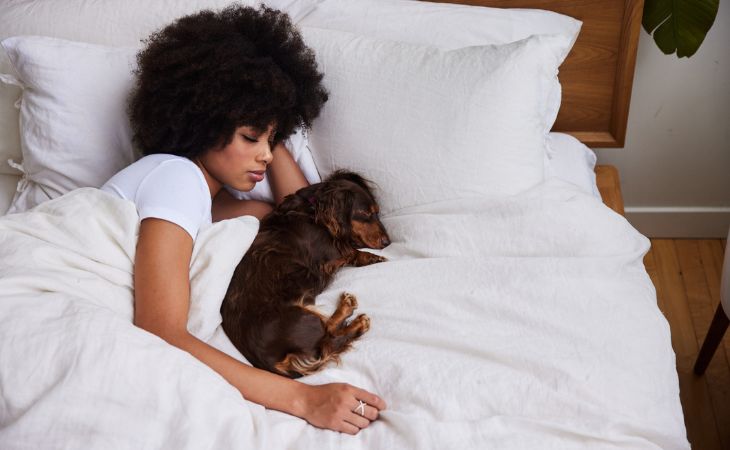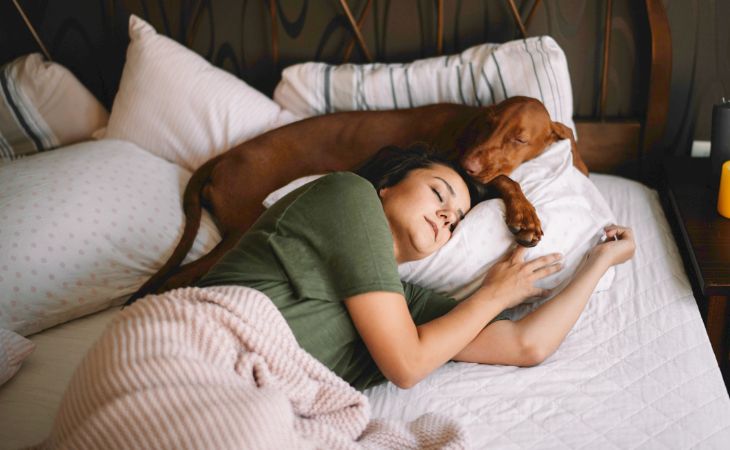Have you recently adopted a dog and they won’t stop inviting themselves into your bed? Do you intend to share a bed with your dog, but you don’t know how to do this correctly? While sleeping with a pet is a relatively common practice, here are five tips and precautions to take into account.
#1 Make sure that your dog is healthy
If you intend on sleeping with your dog, verify that they do not have any health issues. While the transmission of diseases between dogs and humans is rare, sleeping together can raise the risks of transmitting certain parasites to you and other members of your family.
For this reason, before you start sleeping with your dog, it’s important to make sure that they are in good health. Many parasites can attack your pet’s body.
Intestinal worms
Dogs are prone to intestinal worms. Moreover, puppies are particularly exposed to this. Unfortunately, these worms can transmit to their owners through direct contact. This can be while cleaning up after them when they relieve themselves, for example.
Fleas
While fleas mainly live on dogs, they can also live on cats and ferrets. Their presence is characterized by the loss of hair and itchiness. If your pet has fleas, it’s also for you to get bit when you sleep together. Before inviting your dog in your bed, consult a vet to make sure that they have not been invaded by fleas.
Ticks
The risk of being attacked by ticks is particularly high if your pet is a carrier. Ticks like to hide inside ears, between toes, around the head or under your dog’s front legs. Unfortunately, these insects can also carry Lyme disease.
This infection can lead to cardiac and neurological disorders, as well as joint inflammation. Therefore, it’s important to be careful! Before inviting your dog into your cozy home, make sure that ticks are not clinging to their fur.
Scabies mites
Contrary to the previously mentioned parasites, scabies mites are non-transmissible to humans. With that being said, they can still provoke skin irritations that are often very unpleasant. But, how can you tell if your pet has been affected? Here are the most common symptoms:
- red skin with rashes,
- scabs and dandruff,
- hair loss…
As time passes, the skin gets thicker because of the inflammation and scratching. To prevent your dog from dealing with this, the ideal solution is to give your pet a health check-up to make sure they are free of any signs of parasites. Your vet will be able to show you the right treatments for parasites, and advise you on the best practices for sleeping with your pet.
#2 Regularly change your bedding
There are also risks related to hygiene. If you let your dog sleep under the covers, it’s important to wash your blankets and pillows often. By doing this, you are getting rid of dead hair and reducing the risks of allergies.
If your dog is used to sleeping under the covers and they are difficult to clean or cannot be cleaned in the machine, give your dog their own blankets. This will make sure that they do not bring fleas or other pests into your bed. In addition, to avoid any accidents related to the fabric, opt for flat fabric that cannot be destroyed by your furry friend’s claws.
The quality of the material of your blankets and bedding will define the peacefulness of your sleep. We recommend bedding that is made of natural material to prioritize the evacuation of heat and humidity. Cotton is the most recommended to keep stable temperatures all night. Linen is also appreciated for its antibacterial character and its ability to regulate body temperature.
Our four-legged friends are not immune to nighttime leaks. Therefore, it’s best to protect your mattress. Opt for a breathable mattress protector that is easy to clean. This accessory will guarantee the durability of your bedding and allow you to sleep peacefully.

#3 Take into account hygiene before sleeping with your dog
While sleeping with a dog can be pleasant, you need to be aware that dogs are not the champions of cleanliness. If you want to share a bed with your dog, their hygiene needs to be impeccable. Not only does their presence in your bedroom leave dead hair, but potentially also parasites, ticks, fleas, lice and ringworm. These pests are within your reach and can attack you.
For a clean coexistence between you and your dog, it’s important to take a few precautions. For example, clean their paws before letting them come inside after a walk. Also, brush your dog regularly to get rid of dead hair. In addition, deworm your dog regularly.
This Letsgetpet article might also interest you: How often should I wash my dog?
#4 Educate and train your dog
Sleeping with your dog can sometimes cause behavioral problems. Dogs behave according to their place in the hierarchy, with you at the top. By sharing a bed with your pet, you run the risk of disturbing this hierarchical structure.
As a result, they may develop unpleasant behavior and find it harder to accept the rules you impose on them. Moreover, it can become even more complicated if you’re in a relationship. There is a risk that your dog will try to oust your partner, or get the upper hand over them. If you are facing this, it’s a good idea to educate and train your dog properly before they get used to sleeping with you.
Your dog needs to wait for your permission before climbing into bed. This is so that they understand that it’s your space and that you only share it with them because you want to. You should also place a dog bed in the room to send them to if they climb into bed without your permission or if sleeping together in the same bed becomes complicated. In addition, teach them to stay in a specific part of the bed to avoid disturbances while you sleep.
This Letsgetpet article might also interest you: How do I choose the right dog bed for my dog?
#5 Establish a routine to sleep better with your dog
To limit disturbances during the night, you need to get your dog used to a certain routine. Pets actually appreciate this type of regularity. By creating a relaxing routine, you are helping prepare them to sleep. This routine can be a calm play session or a peaceful walk together. It’s best to avoid feeding your dog before sleeping to make sure that they do not need to go outside during the night.
However, your dog also needs to learn to sleep without you from time to time. This way, they can not only avoid developing bad habits, but also learn to be happy even when separated from you. If you encounter issues at this level, contact a dog trainer.

